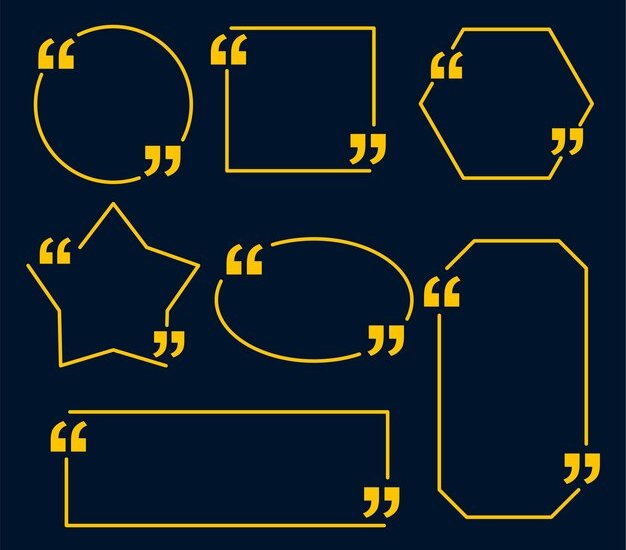How to Use Brackets in Quotes
To use brackets in quotes, you can add additional information without changing the original meaning.
Brackets in quotes are handy for inserting clarifications or explanations within a quote.
Using brackets in quotes allows you to add your own words while still preserving the original message.
Brackets in quotes can be used to correct grammar or spelling errors in the original quote.
You can use brackets in quotes to remove unnecessary words and make the quote more concise.
By using brackets in quotes, you can provide context or background information to give more meaning to the quote.
Using brackets in quotes allows you to make subtle changes to the wording for better clarity.
Brackets in quotes are a valuable tool for editors, writers, and researchers to add their own insights.
Adding brackets in quotes is a way to show that the author is making a specific intervention or comment.
With brackets in quotes, you can add credibility to a quote by including relevant sources or references.
Using brackets in quotes can help you to emphasize or highlight specific parts of the original quote.
By using brackets in quotes, you can indicate when words have been omitted from the original quote.
Brackets in quotes are like an invisible pen that allows you to add your own thoughts to someone else’s words.
With brackets in quotes, you can deconstruct the original quote to analyze its implications or meanings.
How to Use Brackets in Quotes part 2
Using brackets in quotes can be a way to challenge or question the validity of the original statement.
Brackets in quotes give you the power to reshape or reframe the original quote to fit your own argument.
By using brackets in quotes, you can correct factual inaccuracies or outdated information in the original quote.
With brackets in quotes, you can insert alternative interpretations or perspectives to show a different side of the story.
Using brackets in quotes allows you to include translations or explanations of foreign words or phrases.
Brackets in quotes can be used to censor or remove offensive language from the original quote.
By using brackets in quotes, you can add emphasis or a sense of urgency to certain parts of the original statement.
With brackets in quotes, you can add your own commentary or analysis to elaborate on the original quote.
Using brackets in quotes is a way to interject your own thoughts or opinions into someone else’s words.
Brackets in quotes can be used to indicate pauses or interruptions in the speaker’s original words.
By using brackets in quotes, you can signal that you have made important changes to the original quote.
With brackets in quotes, you can show that you are paraphrasing or providing a summary of the original quote.
Using brackets in quotes can help you to maintain clarity and coherence when quoting complex or lengthy statements.
Brackets in quotes allow you to correct any grammatical or syntactical errors in the original quote.
By using brackets in quotes, you can include explanatory notes or comments that provide additional context to the quote.
With brackets in quotes, you can indicate when part of the quote has been omitted or replaced with your own words.
Using brackets in quotes is a way to show respect for the original author’s words while still adding your own insights.
Brackets in quotes can be used effectively in academic writing to demonstrate critical thinking and analysis.
By using brackets in quotes, you can transform a quote into a dialogue or conversation between multiple speakers.
With brackets in quotes, you can update or modernize outdated language or terminology in the original quote.
Using brackets in quotes is a way to show that you are making a specific modification to the original quote to suit your purpose.
Brackets in quotes allow you to add your own examples or illustrations to clarify the meaning of the original quote.
By using brackets in quotes, you can highlight any inconsistencies or contradictions in the original statement.
With brackets in quotes, you can indicate when you are inserting your own words to complete a sentence or fill in missing information.
Using brackets in quotes can help you to add context or relevance to the original quote by providing up-to-date information.
Brackets in quotes allow you to add your own voice or perspective to the original quote, making it more personal.
By using brackets in quotes, you can include alternative or opposing viewpoints to present a balanced argument.
With brackets in quotes, you can identify any biased or subjective language in the original quote.
Using brackets in quotes is a way to maintain the integrity and accuracy of the original quote while adding your own insights.
Brackets in quotes can be used to signal that you are paraphrasing or summarizing a longer passage.
By using brackets in quotes, you can correct any mistakes or errors in the original quote without altering its meaning.
With brackets in quotes, you can indicate when the original quote has been translated from a different language.
Using brackets in quotes is a way to add your own commentary or analysis without distorting the original quote.
Brackets in quotes allow you to insert definitions or explanations of technical terms used in the original quote.
By using brackets in quotes, you can include your own observations or conclusions to enhance the original quote’s impact.
With brackets in quotes, you can signal that you have taken an excerpt from a larger text or conversation.

